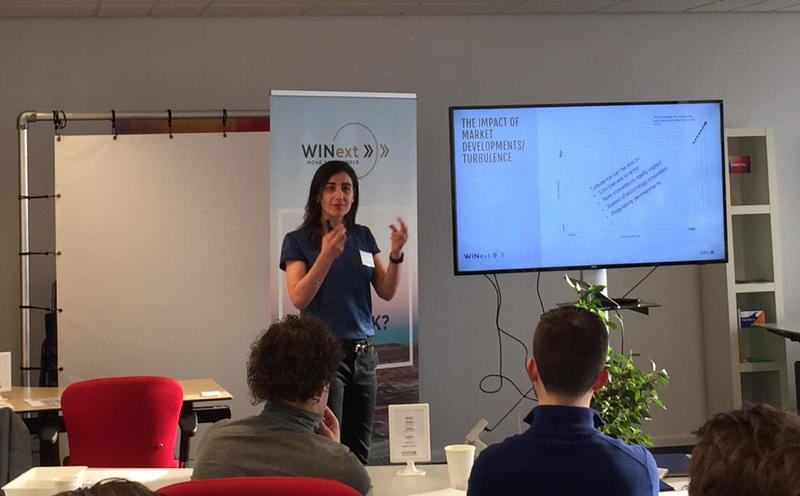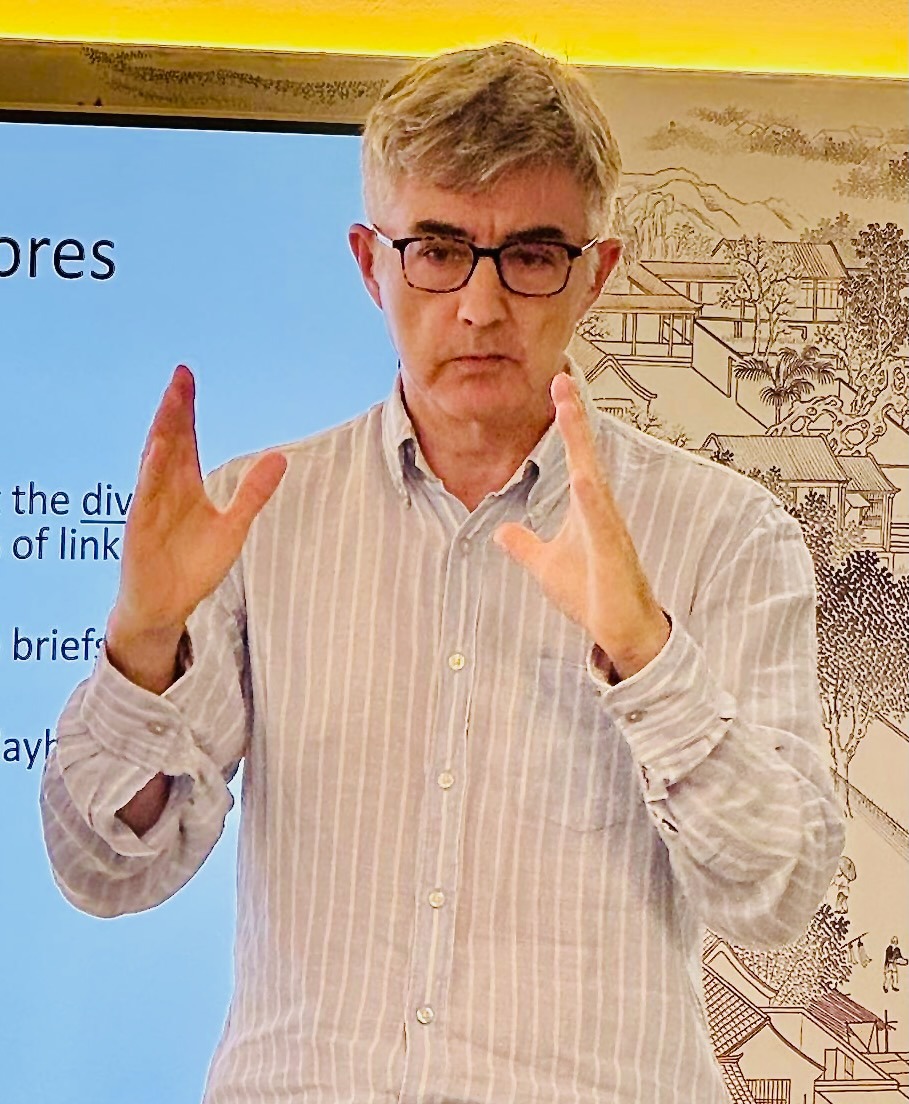Bridging Worlds: A Journey of Growth, Innovation, and Relevance
With the average company lifespan plummeting from 67 years to just 14—and predictions that half of today’s S&P 500 could vanish in the next decade—staying relevant has never been more critical. This article explores the journey of Araz Najarian and how she supports businesses in staying relevant and purposeful through her work at ELP Network.
Founded over 25 years ago, ELP Network emerged from the vision of four individuals— with a combined background of academic expertise, and extensive executive business experience. Together, they set out to bridge these two worlds, creating a practice that would help businesses achieve sustainable growth and maintain relevance in an ever-evolving marketplace. This vision laid the foundation for what would become a thriving business, expanding across multiple meaningful metrics.
A Personal Journey and Evolution

(Photo: Araz Najarian)
Araz Najarian, Partner, ELP Network joined the company in 2008 and became a partner in 2017. Since then, she has enjoyed being part of a partnership that thrives on collaboration and dynamism. “I was drawn to the company at a pivotal moment in my career, thanks to a mentor who encouraged me to explore this path.” Araz recalled.
Having worked in the public sector and civil society organisations, she has spent years pondering a larger question: How can we create large-scale change in how we live and generate value as humans? While her work in the public sector was fulfilling, it was also slow-moving and constrained by bureaucracy. She came to realise that the private sector offered a faster pace, more creativity, and a willingness to challenge the status quo, which was exactly the environment she sought. Araz explains, “Transitioning to the private sector marked the start of a more dynamic and fulfilling journey, where I could help companies transform, innovate, and improve.”
Two Core Principles that Drive ELP Network
Araz shared how ELP Network’s growth has been driven by two key principles. The first revolves around the critical question of why some companies endure for decades—or even centuries—while others struggle to survive. Research, including studies of the S&P index, reveals that the average company lifespan has dropped dramatically from 67 years to 14, with estimates that in a decade approximately half of the S&P 500 will be replaced by new entities. To address this, they combine academic insights with practical business strategies, with a focus on customer value at the core. By maintaining an outward focus and aligning with evolving customer needs, they create what they call an “economic engine” that transforms relevance into sustainable growth.

The second principle recognizes the need for agility in strategy and leadership. Traditional top-down approaches no longer work in today’s fast-paced, complex world. Araz explains that she and her colleagues emphasize a collaborative, iterative process where strategy and leadership development happen in real-time, encouraging growth through hands-on experience rather than isolated leadership training sessions or strategy offsites. This adaptive approach helps businesses stay nimble, innovate continually, and evolve with the times.
As businesses face growing challenges around sustainability, growth, and climate change, one technology has emerged as a standout: generative AI. While AI has been around for some time, its recent surge in public awareness signals the beginning of a new era. Tools like ChatGPT, Perplexity, and Notion now enable anyone—even those without coding experience—to harness the power of AI. This democratization of technology has transformed how businesses operate, but it also raises concerns about maintaining cohesion across organizations. Companies must strike a balance between the autonomy AI offers with the need for unity and security, especially in light of rising cyber threats.
Moreover, AI’s rise is just the latest chapter in a broader technological shift. In the past, businesses focused on adopting digital tools; now, the focus is on integrating those tools into everyday operations. This evolution has significant implications, not just for how businesses work but for how they address sustainability—a growing concern for nearly every company today.
Araz highlighted a project of this transformation, where she collaborated with a global food retailer. Facing the dilemma of balancing health, sustainability, and customer preferences, they rethought their entire approach to product offerings. By shifting away from the traditional model of simply offering variety pushed by conventional merchandising of buying shelf space, they created personalized, subtle interventions—for example programs offering customers suggested guidance on healthier & more sustainable options while also catering to other preferences such as convenience, affordability, indulgence or other. The overall transformation program not only helped the business align with sustainability goals but also improved customer engagement, boosted recurring sales and allowed for a new way of approaching shrinkage and category management.
Supporting Business Leaders: Tailored Guidance for Growth
“Our clients come to us with diverse challenges, from revisiting long-term visions at the end of a planning cycle to navigating the complexities of AI and global developments.” said Araz. Often, these challenges go beyond products, value propositions and processes—they also encompass team dynamics, culture, and leadership. She noted that her team often assists companies tackle the complexities of acquisitions, particularly integration, where many encounter difficulties.

Some of their engagements are more personal, where founders or CEOs seek a sparring partner on signature leadership decisions. Whatever the request, their approach is to care and dare; listen carefully, challenge constructively, re-defining and aligning with clients on their goals for growth and success.
Listening, Challenging, and Aligning: The Value Creation Accelerator Methodology
Araz described the Value Creation Accelerator methodology she and her colleagues have developed to address organizational growth. They start by listening carefully to their clients, ensuring they fully understand clients’ needs and expectations. From there, they engage clients with challenging questions and provide honest insights that may not have been voiced. This approach is built on a belief that real progress comes from constructive, candid dialogue.
The methodology also includes a robust self-assessment tool, which helps organizations understand their performance across key metrics. This includes traditional financial data, such as EBITDA and revenue evolution, as well as customer-centric metrics like Net Promoter Scores (NPS) and loyalty scores. Industry and overall trends are also evaluated to ensure recommendations are informed not only by internal performance but also by the broader market landscape. This comprehensive analysis leads to crucial discussions with leadership teams, guiding them to choose the necessary actions in a critical path for sustainable growth. After delivering the initial findings, the team doesn’t simply step away. Araz expressed her commitment to impact by continuing to collaborate closely with clients to track progress and ensure alignment with desired outcomes. Depending on the needs of the business, she described that support could vary from hands-on engagement with the team to more occasional quarterly check-ins.
AI and Asynchronous Collaboration: A Smarter Way of Working
As the clients Araz works with are leveraging AI, Araz sketched out how the methodology she and her team use is increasingly enhanced by AI, particularly in how they analyse data and extract insights, using generative AI to identify patterns more quickly and build richer narratives from interviews and collected data.
In addition, she and her colleagues embrace asynchronous work within their team and with their clients. Asynchronous working allows teams to collaborate more effectively by giving them time to reflect and contribute at their own pace. While live meetings still have their place, asynchronous collaboration has proven particularly effective for tasks requiring thoughtful consideration, when working across time zones and for more quickly & effectively engaging and mobilising more people in the organisation. This is helping teams work smarter, not harder.
Expanding Reach: Productizing
Araz enthusiastically shared how she and her colleagues see a significant opportunity in expanding their reach to a wider audience productizing certain aspects of their methodology. As most of their services are customised to meet the unique needs of each client, by creating productized versions of their services, they aim to engage more businesses and provide them with valuable insights into how they view organizational growth and relevance.
Araz related that she and her colleagues also facilitate peer-to-peer learning circles and they plan to expand this by building communities of entrepreneurs and business leaders who can share knowledge, explore next practices, and support each other’s growth. This approach not only helps them scale but also cultivates a dynamic learning community, ensuring that businesses can continue to grow and adapt in an ever-evolving world.
Quote
Araz’s favourite quote is: “In the beginner’s mind there are many possibilities, but in the expert’s, there are few.” – Shunryu Suzuki, author of Zen Mind, Beginner’s Mind.
You’re welcome to share your thoughts by clicking the button below.



